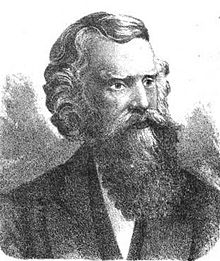Charles Anderson (governor)
| Charles Anderson | |
|---|---|
 |
|
| 27th Governor of Ohio | |
|
In office August 29, 1865 – January 8, 1866 |
|
| Preceded by | John Brough |
| Succeeded by | Jacob Dolson Cox |
| 7th Lieutenant Governor of Ohio | |
|
In office January 11, 1864 – August 29, 1865 |
|
| Governor | John Brough |
| Preceded by | Benjamin Stanton |
| Succeeded by | Andrew McBurney |
| Member of the Ohio Senate from the Montgomery & Warren Counties district |
|
|
In office December 2, 1844 – December 6, 1846 |
|
| Preceded by | Joseph Barnett |
| Succeeded by | John Hopkins |
| Personal details | |
| Born |
June 1, 1814 Louisville, Kentucky |
| Died | September 2, 1895 (aged 81) Kuttawa, Kentucky |
| Political party |
Republican Whig |
| Alma mater | Miami University |
| Military service | |
| Allegiance |
|
| Service/branch |
|
| Years of service | August 9, 1862 - February 21, 1863 |
| Rank |
|
| Unit |
|
Charles Anderson (June 1, 1814 – September 2, 1895) was first a Whig and later a Republican politician from Ohio. He served briefly as the 27th Governor of Ohio.
Anderson was born in Louisville, Kentucky, to a prominent family; his father was an aide to the Marquis de Lafayette during the American Revolution. Anderson graduated from Miami University in 1833, studied law and was admitted to the Ohio bar. He moved to Dayton, Ohio, where he began a law practice and was later elected county prosecutor.
In 1844, Anderson was elected to the Ohio Senate and made a name for himself as an advocate for black rights. He then moved to Texas for health reasons. He gave an impassioned speech in San Antonio in December 1860, strongly opposing secession and calling for the "perpetuity of the national Union." Angry local pro-Confederates threatened Anderson and arrested him without charge, but Anderson escaped and returned with his family to Dayton.
President Abraham Lincoln sent Anderson on a pro-Union speaking tour of Europe, after which Anderson accepted command of the 93rd Ohio Infantry and was commissioned in the Union Army as a colonel. Badly wounded at the Battle of Stones River, Anderson resigned his commission and returned to Ohio to recuperate.
Anderson was elected the seventh Lieutenant Governor of Ohio in late 1863 and took office the following year. On August 29, 1865, he became Governor upon the death of Governor John Brough.
...
Wikipedia
